UNESCO
See the following -
Digitizing Maps Of Malaria Hotspots To Save Lives
Mapping collaboration between Europe and Africa has led to the creation of a digitized malaria mapping database that for the first time brings together all available malaria data, helping tackle a disease that kills more than 660,000 people every year.
- Login to post comments
Half of the World’s Languages Are Dying. Should We Save Them?
 There are currently around 7,000 languages being used today, with one language dying every two weeks. UNESCO says that half of the world's languages may vanish in a century's time. And, in my home country of India, 220 languages have died in the last 50 years and 197 languages are endangered. Open science is advancing scientific research by enabling individuals and organizations to collaborate and exchange knowledge that improves each other’s work. One area that could use this kind of help is native languages around the world...
There are currently around 7,000 languages being used today, with one language dying every two weeks. UNESCO says that half of the world's languages may vanish in a century's time. And, in my home country of India, 220 languages have died in the last 50 years and 197 languages are endangered. Open science is advancing scientific research by enabling individuals and organizations to collaborate and exchange knowledge that improves each other’s work. One area that could use this kind of help is native languages around the world...
- Login to post comments
INASP Launches Open Access Week Competition 2015
 INASP has launched its Open Access Week Competition for 2015. The competition is open to representatives of institutions and organizations from INASP partner or network countries. Open Access Week, a global event now entering its seventh year, is an opportunity for the academic and research community to learn more about the potential benefits of Open Access, to share what they’ve learned with colleagues, and to help inspire wider participation in Open Access developments. For more information, see OpenAccessWeek.org.
INASP has launched its Open Access Week Competition for 2015. The competition is open to representatives of institutions and organizations from INASP partner or network countries. Open Access Week, a global event now entering its seventh year, is an opportunity for the academic and research community to learn more about the potential benefits of Open Access, to share what they’ve learned with colleagues, and to help inspire wider participation in Open Access developments. For more information, see OpenAccessWeek.org.
UNESCO Partners With Nature Education And Roche To Launch The World Library Of Science: A Free Online Science Education Resource
UNESCO launched the UNESCO World Library of Science (WLoS), a newly created, free online science education resource for a global community of users. Developed through the joint efforts of UNESCO, Nature Education and Roche, the WLoS was created to give students around the world, especially those in disadvantaged regions, access to the latest science information as well as the opportunity to share their experiences and learning through discussion with their peers in a shared learning environment... Read More »
- Login to post comments
Using Open Data to combat Global Health, Water Supplies, and other Critical Issues
History shows us the power of information to avert crisis. For example, as a result of a dramatic increase in data, the public health community has transformed its ability to identify and respond to a pandemic. Less than 20 years ago, it took, on average, 167 days to detect and verify a disease outbreak. Read More »
- Login to post comments